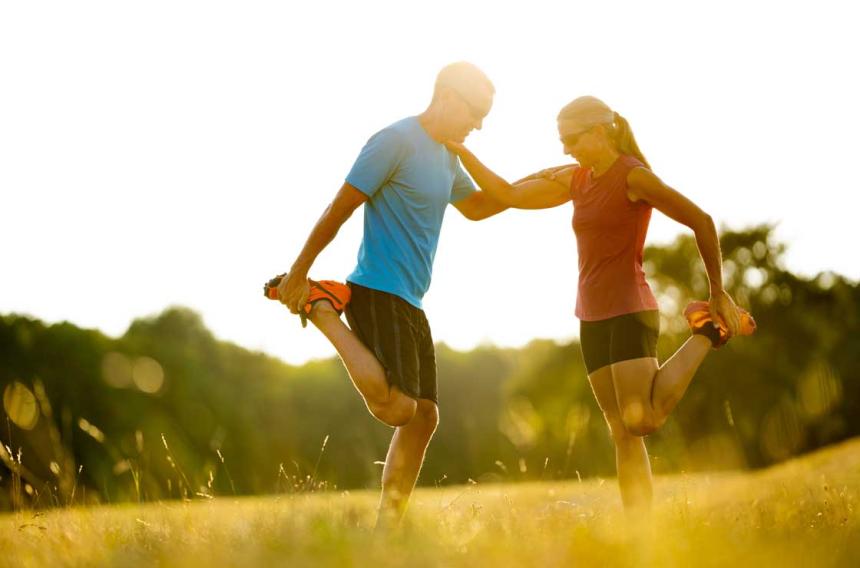5 Tips to Survive Hot Summer Workouts

It’s mid-summer, 90 degrees and humid, but you want to work out and you prefer doing it outdoors. Treadmills really aren’t your thing – you feel like a hamster walking or running on one.
You’re probably aware summer heat raises your risk for sunburn, heat cramps, heat exhaustion and heat stroke, so it’s important to talk to you doctor before you work out in high temperatures. If you get clearance, there are strategies that can help make summer workouts more enjoyable. Try these five tips.
Wait for favorable conditions.
If you exercise regularly, you probably prefer a certain time of day. But during the summer, you may want to adopt early morning workouts because it’s cooler -- temperatures are lowest just after sun rise. And during the summer, unhealthy ozone levels are usually higher in the afternoon and evening.
Or wait until after the sun goes down. Just make sure you exercise in a well-lit place and make yourself visible to motorists.
Dress for summer workouts.
There are so many options, you’re going to have to do some shopping (and soul searching).
Let’s start with fabrics. Generally, natural fibers such as bamboo, Tencel® and cotton are breathable and more comfortable than synthetic fabrics. They also don’t trap sweat and body odor. However, some synthetic manufacturers weave anti-microbials or silver nanoparticles into their workout gear to prevent clothes from smelling. Some synthetic brands also produce clothes that are breathable, water resistant and able to wick sweat away from your body.
Your next decision is loose- vs tight-fitting clothing. Loose-fitting clothes will allow for better air circulation over your skin, compared to tight-fitting clothes. But excess material, including cargo pockets and wider legs can cause drag, slowing your performance time. The purpose of your workout, whether it’s training for a race or going for a recreational workout, will help guide your choices.
Ideally, summer workout gear should be light in color to help reflect heat. Select visors with mesh inserts and bicycle helmets with deep vents to help body heat escape through your head.
If you’re working out in the sun, you may want to invest in sun-protective clothes. You’ll also want to liberally apply sunscreen with UVA and UVB ray protection and an SPF between 30 and 50 before going outside to workout. If you sweat a lot during your workout, you may need to reapply. If you’re a swimmer or involved in water sports, a wide array of water-resistant sunscreens is available. And consider using zinc oxide on areas that easily burn, like your nose.
Be strategic about your workout route.
Asphalt and concrete get much hotter in the summer than dirt, gravel or grass. You might find some relief from the heat if you move your walk/run/ride from a sidewalk or bicycle lane to an unpaved park trail.
Altitude training (exercising uphill or at a higher elevation) also is more difficult during the summer. The air quality may better at a higher altitude, but it’s also thinner. Less oxygen causes your heart and lungs to work harder, as can higher temperatures. If you live in an area with a higher elevation and still want to exercise outdoors, you may have to taper back on the intensity to prevent feeling sick. And if you’re routine workout includes hills, you may want to find a flatter route for the summer.
Stay hydrated
Rehydration is an essential part of recovering from a workout -- it helps lower temperature and heart rate, lubricate joints, repair muscles, ward off muscle cramps, ease fatigue and keep the digestion process working properly. And of course, it helps prevent dehydration. While water is the go-to drink for everyone before, during and after physical activity, enhanced water, sports drinks, coconut water, chocolate milk and tart cherry juice also have value. Which beverage is right for you? Your activity and intensity level will dictate your choice. Although it’s not an exact science, some guidelines exist. Here’s what you need to know about the best post-workout drink options.
Listen to Your Body
Don’t push your body to the point of feeling sick. Working out in the heat isn’t easy and raises your risk for heat-related illnesses, such as heat cramps, heat exhaustion and heat stroke. If you feel faint, dizzy, confused or nauseous and/or experience breathing changes (e.g., shortness of breath or rapid breathing), muscle spasms, vomiting, headache, changes in your usual sweating pattern, (e.g., excessive sweating or lack of sweating), you should rest, move to a cooler place and hydrate. You should see a doctor if you think you’re experiencing heat exhaustion or heat stroke.
Keep in mind that some medications might make you more susceptible to heat stroke. Medications used to control blood pressure or an enlarged prostate have a tendency of making you feel dizzy in the heat. And diuretics can cause dehydration in hot, humid weather, so talk to your doctor before exercising outdoors in the summer.
If you’re not taking medications but still have a tough time dealing with heat or plan on running or cycling long distances, some experts recommend a pre-workout cooldown such as a cold shower. You can also place an ice pack on your neck for a few minutes to help lower your core body temperature.
Talk to your doctor before working outdoors in the summer. If you don’t have a primary care physician, consider partnering with an MDVIP-affiliated physician. MDVIP doctors have the time to work with you and develop a wellness plan. Find a physician near you and begin your partnership in health »


